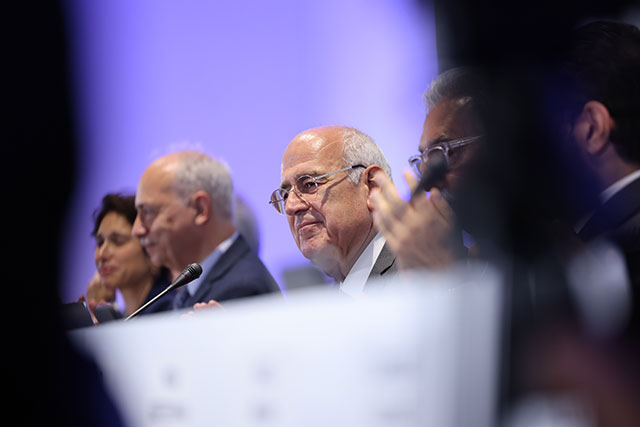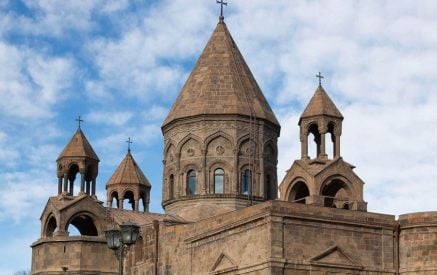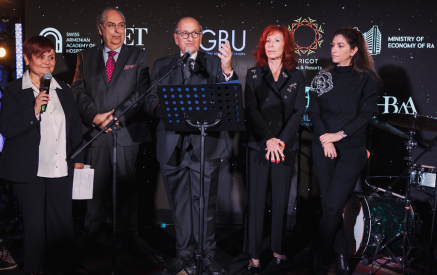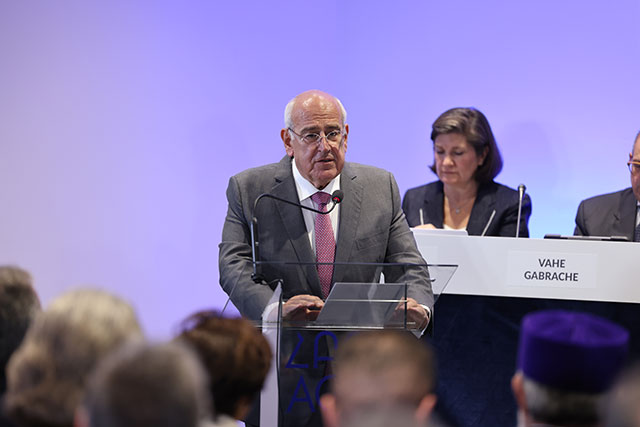President Berge Setrakian’s Address at the 92nd General Assembly
Your Excellency, President of Armenia, Your Holiness Supreme Patriarch and Catholicos of All Armenians, Mr. High Commissioner of Diaspora Affairs, Members and Friends —
I stand here before you today from Yerevan in the company of AGBU members, supporters, and friends from around the world. Many have come from long distances to meet again in person, after far too long. But more important, we are here to show our solidarity with the people of Armenia as they continue to show resilience in the face of great uncertainty.
Read also
Over the last two years of so much tragedy and loss, our ongoing relief and recovery work has allowed us to meet hundreds of Armenians and their families. These up-close encounters have revealed to us a steadfast determination and hope. This is just like in times past, when that same indomitable Armenian spirit rises up even stronger, just when it looks like we are at our weakest.
At our last General Assembly, I characterized AGBU as vibrant and relevant, descriptors that I have used time and again. Vibrant, because the AGBU spirit reflects on a culture that is creative, life-affirming, and forward-looking. Relevant, because we embrace innovation, make it our business to stay attuned to the needs of every generation and evolve with changing times.
While these attributes remain true, many of us are likely questioning whether vibrancy and relevance are enough considering all that has happened in the last two years to test the Armenian Nation to its core. Last month, our anxieties and concerns about the future of our homeland were given another big jolt with the Azeri attack on sovereign Armenian soil.
Armenians are once again the target of prejudice and aggression by historical enemies. At the same time, we are not even on the radar for many countries that we consider friendly. It feels like we are cornered, isolated, and trapped.
But as sure as I am standing here today, I am convinced that we can overcome this doomsday mentality by reminding ourselves of who we are. That our story of survival is unbroken through millennia.
But that doesn’t mean we should be complacent. This is an uphill battle that requires us to use every lever, advantage, skill set and area of expertise to protect our right to exist as a free, and independent nation. That means putting aside our differences and uniting our efforts for maximum impact. We do not have the luxury of partisanship or vindictiveness. Rather we must pool our resources. And paramount to all that is developing a healthy and “reciprocal” relationship between Homeland and Diaspora.
As we learned from all the trials of the last several years, at the end of the day, Armenians can only count on Armenians. Yes, we have our hopes that the ongoing political developments and the slow, intricate negotiations between Armenia, Turkey, and Azerbaijan, brokered by Russia and western powers will be fair, and just. We hope that pending talks related to our borders and the opening of transportation routes within the region are carried out with the sovereignty of our homeland and the safety of our people foremost in mind. Nevertheless, we must not let Armenia’s weakened hand allow us to fold when it comes to protecting the territorial integrity of our homeland.
Well, here is one decision that we don’t need to wait on foreign countries to make. It’s a decision that we must make together and without delay. We must decide if we have the will to rise to the challenge. Do we have the capacity to work together? Can we trust one another to do what’s right for the future of our nation without the turf wars and grandstanding? We have so much at stake that something must change—and it’s not as much changing the minds of foreign powers but changing how we engage with one another.
Recognizing the urgency of the moment, AGBU calls on all Armenians in the Diaspora and the Homeland to bring their respective areas of expertise, their involvement, and their formidable resolve to the mission of national viability.
We call on Armenia’s politicians to put their partisan interests aside to restore the trust and confidence of their citizens. We would like to see the government implement a sound, coordinated set of policies starting with cultivating diplomacy skills to reshape the role of Armenia in the region. We would like to see meaningful and objective socio-economic programs focused on fortifying the infrastructure of the country.
With a moral and practical approach, those in leadership can lay a new foundation for a prosperous and secure Armenia. We are at a crossroads and no government, organization or group can afford to operate in isolation.
The Armenian Church also plays a pivotal role in the development of Armenia’s society. We support our national church as an institution which holds our spiritual lineage and identifies us within the community of nations. When Armenia won its independence and was transitioning from secularity of the Soviet state, His Holiness Vasken I of Blessed Memory reminded us that, and I quote, “Throughout history, under the slogan one nation, one unified state, and one church, the Armenian Nation and the Armenian Church gave meaning to each other’s existence and strengthened each other during their common struggle.”
In fact, in one of the first judicial acts adopted by the democratically elected members of the Supreme Council of Armenia, the Armenian Apostolic Church was recognized as the historic church of the Armenian people and an important institution for national preservation. Let us not forget these moments of unification. Let us learn from them and build toward that goal.
AGBU remains committed to contributing to the building institutions for the nation and cultivating leaders of tomorrow both in Armenia and in the Diaspora. We will continue to provide the resources to help new generations of Armenians thrive in all corners of the world. Projecting some of our actions for the near future, we will account for the diversity of perspectives from the Diaspora and realign our priorities accordingly.
One such priority has already been made clear: Armenia and Armenians need a place of collective expertise to assist in proactive diplomacy and research. As such, we are proud to announce the launch of the Applied Policy Research Institute, APRI Armenia. It was established earlier this year in view of the dire need for deep insight, dynamic policy dialogue and a clearer understanding of Armenia in its geopolitical context. As an emerging think tank and policy accelerator, APRI is focused on advancing regional stability, sustainable prosperity, and concrete problem solving.
APRI Armenia will belong to the nation, just as many other institutions that have been initiated by proud and motivated individuals seeking to serve the global Armenian nation. Take for example the American University of Armenia which was spearheaded by our late President Louise Simone. This institution became the first western university in the post-soviet countries. We set the bar high then and continue to do so now.
The groundbreaking TUMO Center for Creative Technologies has raised Armenia’s visibility across the globe in non-Armenian communities. It was founded by our very own Sam and Silva Simonian. And, our Armenian Virtual College (AVC) has received international recognition as a model of virtual learning. It was established by our very own Dr. Yervant Zorian. We are proud of them all, each of whom have deep roots in AGBU.
These bold initiatives by inspired individuals, exemplify the Diaspora’s faith in the people of Armenia and the power of collaboration to make great things happen for all Armenians.
At the same time, our Central Board will look to the leadership in our regions to develop a roadmap for the next era. As our AGBU offices, Chapters and Young Professionals groups work to advocate for our causes and assist communities in need, the Central Board will continue to pursue important discussions and forums with fellow leaders, here in Armenia, and abroad.
I thank you all for joining us today and for being part of our organization’s journey. As you can see from our biennial report for the years 2020 and 2021, as well as the testimonials and reports presented today, AGBU is an ever-expanding universe its own.
I have had the great honor of serving this institution for 20 years as its president. Still, when I am approached by an unfamiliar face—perhaps a young student who received an AGBU scholarship or an artist who has just performed on a world stage with our assistance— I am truly touched by the stories they share with me.
And to those who serve on our committees around the world, I am forever grateful for your commitment. You carry the spirit of AGBU with you each and every day.
These last two years have been daunting and difficult, but when I reflect on the tremendous relief efforts carried out by our local volunteers and staff, supported by a surge in donor engagement, and the rise in community activism, I know the future of AGBU is in good hands.
Always remember, this is the organization whose first President, Boghos Nubar Pasha headed the Armenian National Delegation at the Treaty of Sevres to defend the interests of the Armenian people. This is the organization that helped pick up the pieces after the Genocide. This is the organization, that against all odds, found ways in the Soviet era to build institutions, repatriate families and support the Church. This is the organization that mobilized quick relief efforts after the earthquake and in the aftermath of the first and most recent Artsakh War. And this is the organization that will continue to help Armenians in dark times, find the light.
Your support during these critical times has been truly remarkable. Thank you for your generosity, your commitment, and your faith in AGBU. Now more than ever—In unity is strength.





























































